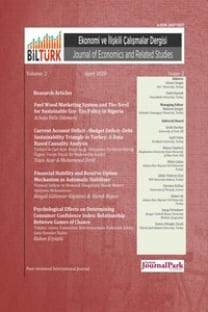Pandemics After 2000 and Their Economic Effects
Dünya tarihine baktığımız zaman geçmişten günümüze çok sayıda salgının ortaya çıktığını ve bu salgınların halk sağlığı problemi olmanın ötesine geçerek ekonomik krizlere yol açtığını görmekteyiz. Salgınlar kişiden kişiye bulaşırken ülkeden ülkeye de ekonomik bulaşıcılık göstermektedir. 2000 sonrasında sırayla SARS, Domuz Gribi, MERS, Ebola ve Covid-19 olmak üzere beş büyük salgın ortaya çıkmış ve bu salgınlar ekonomik kayıplara yol açmıştır. Salgının bulaşıcılığı, öldürücülüğü ve etki süresi ne kadar yüksekse ekonomik kaybın da o denli yüksek olduğu görülmektedir. Sırasıyla SARS 33 milyar $, domuz gribi 45-55 milyar $, MERS 10 milyar $, Ebola 53 milyar $ ve Covid-19 şimdiye kadar 9 trilyon $ değerinde ekonomik kayba yol açmıştır. Ekonomik kayıplara baktığımız zaman SARS ve MERS’nin bulaşıcılığının ve öldürücülüğünün diğer salgınlardan daha az olması nedeniyle ekonomik kayıp değerinin daha az olduğu görülmektedir. Diğer taraftan vaka sayısı, ölüm oranı, yeni mutasyonların ortaya çıkışı, hızlı yayılımı ve hala devam ediyor olması gibi faktörler Covid-19 salgınının ekonomik olarak daha ağır bir tablo vermesini sağlamaktadır. Bahsi geçen tüm salgınlar sektörel gelir kayıplarının yanı sıra yatırım, üretim, tüketim, istihdam, enflasyon, döviz kuru, dış ticaret ve piyasalar üzerinde önemli sonuçlar doğurmuştur.
Çalışmada ekonomik krizlere neden olduğu gerçeğinden hareketle özellikle yakın tarihte gerçekleşen salgınların dünya ekonomisi üzerindeki etkilerinin değerlendirilmesi amaçlanmıştır. Böylece 2000 sonrasında yaşanan büyük salgınların yarattığı ekonomik tahribat sayısal olarak görülebilecek ve ekonominin hangi alanlarını daha fazla etkilediği belirlenebilecektir.
Anahtar Kelimeler:
salgın, pandemi, SARS, H1N1, domuz gribi, MERS, ebola, covid-19, koronavirüs, ekonomik etkiler
Pandemics After 2000 and Their Economic Effects
When we look at the world history, we see that many epidemics have emerged from the past to the present and that these epidemics have gone beyond being a public health problem and have led to economic crisis. While epidemics are transmitted fom person to person, they also show economic contagion from country to country. After 2000, five major epidemics emerged, namely SARS, swine flu, MERS, Ebola and Covid-19, and these epidemics caused economic damage to the world economies. When we examine these epidemics, we see that the higher the infectiousness, mortality and duration of the epidemic, the higher the economic loss. When we look at the economic losses caused by the epidemics, SARS $33 billion, swine flu $45-55 billion, MERS $10 billion, Ebola $53 billion and Covid-19 $9 trillion have had a negative impact on GDP so far. When we look at the economic losses, it is seen that the economic loss is less because the infectiousness and mortality of SARS and MERS are less than other epidemics. On the other hand, the Covid-19 epidemic presents a more serious economic picture as a result of factors such as the number of cases, death rate, the emergence and rapid spread of new mutations and the fact that it still continues. All the aforementioned epidemics have had significant consequences on investment, production, consumption, employment, inflation, exchange rate, foreign trade and markets, as well as sectoral income losses.
In this study, it is aimed to evaluate the effects of recent epidemics on the world economy, based on the fact that epidemics cause economic crises. Thus, the economic losses caused by the major epidemics after 2000 can be seen numerically and it will be possible to determine which areas of the economy are more affected.
___
- Ay, Ahmet, 2020. Orta Doğu Solunum Sendromu Coronavirüs Salgınları, ESTÜDAM Halk Sağlığı Dergisi, 5: 158-167.https://www.worldometers.info/coronavirus/, (15.08.2021)
- Baldwin, Richard, Beatrice Weder di Mauro, 2020. Economics in the Time of COVID-19, CEPR Press: London.
- Begley, Sharon, 2013. Flu-conomics: The Next Pandemic Could Trigger Global Recession, https://www.reuters.com/article/us-reutersmagazine-davos-flu-economy/flu-conomics-the-next-pandemic-could-trigger-global-recession-idUSBRE90K0F820130121, 18.08.2021.
- Bofinger, Peter, Sebastian Dullein, Gabriel Felbermayr, Clemens Fuest, Michael Hüther, Jens Südekum and Beatrice Weder di Mauro,2020. Economic İmplications of the COVID-19 Crisis for Germany and Economic Policy Measures, CEPR Press: London.
- CDC, 2003. https://www.cdc.gov/mmwr/preview/mmwrhtml/mm5249a2.htm, 18.08.2021.
- The Centre for Evidence-Based Medicine, https://www.cebm.net/covid-19/covid-19-deaths-compared-with-swine-flu/, (27.08.2021).
- GPMB-Global Preparedness Monitoring Board, 2019. A World at Risk: Annual Report on Global Preparedness for Health Emergencies, https://apps.who.int/gpmb/assets/annual_report/GPMB_annualreport_2019.pdf, 20.08.2021.
- Hai, Wen, Zhong Zhao, Jian Wang, Zhen-Gang Hou, 2004. The Short-Term Impact of SARS on the Chinese Economy, Asian Economic Papers, 3(1): 57-61.
- IMF, World Economic Outlook, http://blogs.imf.org, (23.08.2021)
- Kaner, Jolia ve Sarah Schaack, 2016. Understanding Ebola: the 2014 epidemic, Globalization and Health, 12(53): 2-7.
- Le Pan, N., 2020, Visualizing the History of Pandemics, https://www.visualcapitalist.com/history-of-pandemics-deadliest/, (15.08.2021).
- Lee, Jong-Who, Warwick J. McKibbin, Estimating the Global economic Costs of SARS, 2004. www.ncbi.nlm.nih.gov/books/NBK92462/, 23.08.2021. OECD, OECD Ekonomik Görünümü 2021, https://www.oecd-ilibrary.org/, 19.08.2021.
- Scott, Susan ve Christopher Duncan, (2004). Return of the Black Death: The World’s Greatest Serial Killer, John Wiley&Sons: UK.
- WHO, Summary of Probable SARS Cases with Onset of İllness from 1 November 2002 to 31 July 2003, https://www.who.int/publications/m/item/summary-of-probable-sars-cases-with-onset-of-illness-from-1-november-2002-to-31-july-2003, (24.08.2021).
- WHO, 2020. COVID-19 Global, https://www.who.int/emergencies/disease-outbreak-news/item/2020-DON305, (16.08.2021).
- The World Bank, 2014-2015 West Africa Ebola Crisis: Impact Update, https://www.worldbank.org/en/topic/macroeconomics/publication/2014-2015-west-africa-ebola-crisis-impact-update, 25.08.2021.
- Worldometers, 2021. COVID-19 Coronavırus Pandemic, https://www.worldometers.info/coronavirus/, (16.08.2021).
- Yayın Aralığı: Yılda 4 Sayı
- Başlangıç: 2019
- Yayıncı: Fatih DEYNELİ
